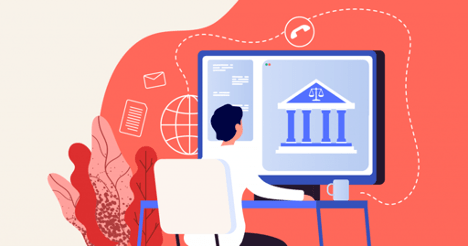By: Maura Arnold
Many, if not all of us, have been selected at some point in our lives for jury duty. Sometimes you are lucky enough to be selected after hours of waiting for your name to be called. Among the highest of honors, is that of being selected to serve on a grand jury. Generally, grand juries are made up of the same citizens that make up trial juries but serve a different purpose. Grand juries are called at the beginning of the criminal justice process and determine whether certain charges will be filed against a defendant. Trial juries are called at the end of the criminal process and are asked to determine the verdict of a trial. Grand jurors can serve their duty for months at a time.
COVID-19 has inevitably disrupted every aspect of life as we know it, and the American jury process is no exception. In March of 2020, the criminal justice system came to a screeching halt as litigators, courtrooms, and judges scrambled to figure out the best way to pursue justice in this new environment. As the Center for Disease control urged social distancing protocols, courts found jury duty difficult to implement in person, as jurors are normally packed closely in a room. Many court systems simply did not have the resources to accommodate the required social distancing of six feet between prospective jurors. Furthermore, those with compromised immune systems are at a heightened risk of contracting COVID-19, making it unlikely that they would come to the courthouse willingly amid the pandemic.
Some states, such as New Jersey, sought a solution to this problem by implementing a remote grand jury pilot program. This pilot program involves following court proceedings on a computer, tablet, or mobile device via the app Zoom. Confidentiality is imperative to the grand jury process, so grand jurors are required to take a heightened oath of security that accounts for the risks of participating in a virtual proceeding.
There are many benefits to conducting grand jury proceedings in this way given the current state of the world. One is that it helps to ensure a diversified jury population. Courts feared the effects of conducting in person grand juries as they may be self-selecting. Those citizens who are at heightened risk of COVID-19 or who live with a loved one who is at risk would likely not be comfortable with reporting for in person jury duty. This would eliminate certain groups of the population, particularly those over the age of 60. Conducting grand juries in this way primarily aims to help defendants by resuming the criminal justice process, as many were held in jail awaiting grand jury indictment when COVID-19 hit. This was of particular concern due to the fact that many jails were ravaged by the disease, and those being held were at heightened risk of contracting it. Furthermore, conducting grand juries from home affords jurors a level of comfort and accessibility as they can conduct their service from their own living room. This cuts down on travel time to the courthouse and the associated costs. While there are many benefits to conducting grand jury proceedings in this way, there are also significant drawbacks.
Notably, prosecutors in New Jersey came out against the process and called them a “constitutional mistake.” They asserted 3 flaws in the process including grand juror’s unequal access to technology, access to confidential and private spaces in their own homes, and the possibility of technological issues. Defense lawyers have also come out strongly against the program, asserting concerns that not all of the cases heard by virtual grand juries have been for those held in custody awaiting indictments as the program was originally intended for. Furthermore, criminal defense lawyers also expressed concerns over confidentiality as a grand juror has no way of truly preventing a household member from hearing or seeing the proceedings on their screen.
Other states, such as Virginia, Oregon and Texas have successfully adopted socially distanced juries thus far. These proceedings have been held in large courtrooms, theaters, or school auditoriums. Some of these protocols require courts to get creative – using tape measures, rope, and hockey sticks, among other household items, to keep individual jurors socially distant. Other courts have installed plexiglass barriers and called for those reporting for jury duty to wear masks and face shields. In addition to these measures, states are considering whether more regulations such as costly air filters need to be utilized in courthouses to circulate air and eliminate contaminants. The cost of in person proceedings during this time has increased, including the potential cost of health to a juror, judge, attorney, witness, or defendant.
Ultimately, there is no easy answer to the issue at hand. At the heart of this entire process is allowing for justice to be served. As the old saying goes, justice delayed is justice denied. Virtual grand juries enable the criminal justice system to continue functioning. While they may not be perfect, in person grand juries also pose certain risks. Given the urgency of the COVID-19 pandemic in the United States, courts attempted to implement a quick and equitable solution. To many, virtual grand juries seemed to be the best solution to protect the health of citizens while always putting justice first. Without a doubt, when in-person proceedings return, there will be significant litigation over the validity of virtual grand juries.
Student Bio: Maura Arnold is currently a second-year law student at Suffolk University Law School. She is a staffer on the Journal of High Technology Law. Prior to law school, Maura received a Bachelor of Arts Degree in English Literature and Italian Language from the College of the Holy Cross.
Disclaimer: The views expressed in this blog are the views of the author alone and do not represent the views of JHTL or Suffolk University Law School.

